What does it take to get a local bike brand into the Tour de France?
“About US$5 million,” says Rob Gitelis, “if it’s a poor bike. Or US$2 million with a great bike. Ours is a great bike.”
Former-professional Gitelis is the owner of Factor Bikes. Since the beginning of this year he has sponsored the bicycles of Israel Start-up Nation (ISN), the newest team on the Tour de France (TdF) start line. With Giant rumoured to be without a team next year, this could leave Factor as one of only two Taiwanese bike manufacturers (along with Merida, which sponsors the Bahrain-Mclaren team) appearing in the World Tour flagship race.
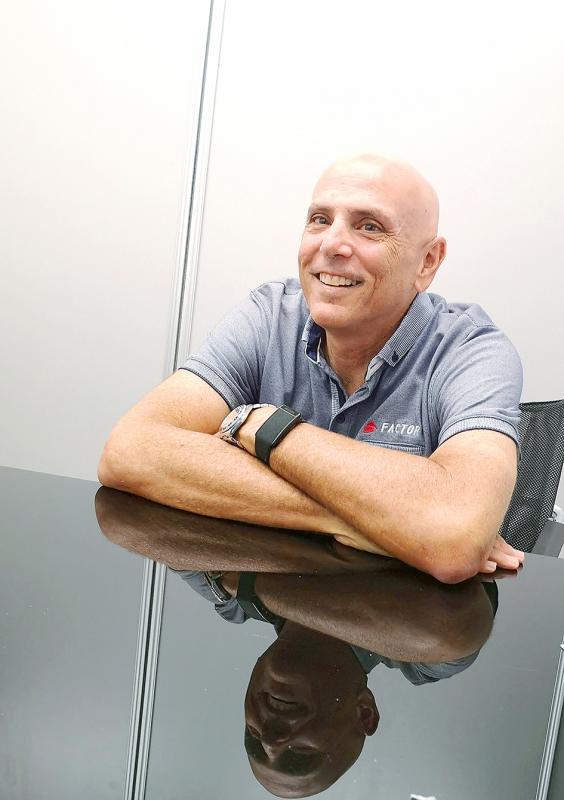
Photo: Mark Caltonhill
To be accurate, Gitelis says around 40 percent of Factor bikes are made in Taiwan (the other 60 percent in his China factory), but all designed, assembled and finally distributed from its headquarters in Taichung.
And, for largely historical reasons, Factor is listed in TdF statistics as a British brand. This dates back to 2009 when Gitelis was asked by BF1 Systems to help design a high-end bike to accompany the launch of Aston Martin’s One-77 sports car. This was followed by the 2013 Vis Vires, which won a Eurobike Show gold award. With then-partner Baden Cooke, Gitelis was looking to launch his own company, and buying the Factor brand made more sense than plucking some new name out of thin air.
The Factor name plus their personal connections on the world circuit, where Cooke won the 2003 TdF green jersey for top sprinter, took the new company straight to sponsoring UK’s ONE Pro Cycling team at the second-tier pro continental series in 2015.
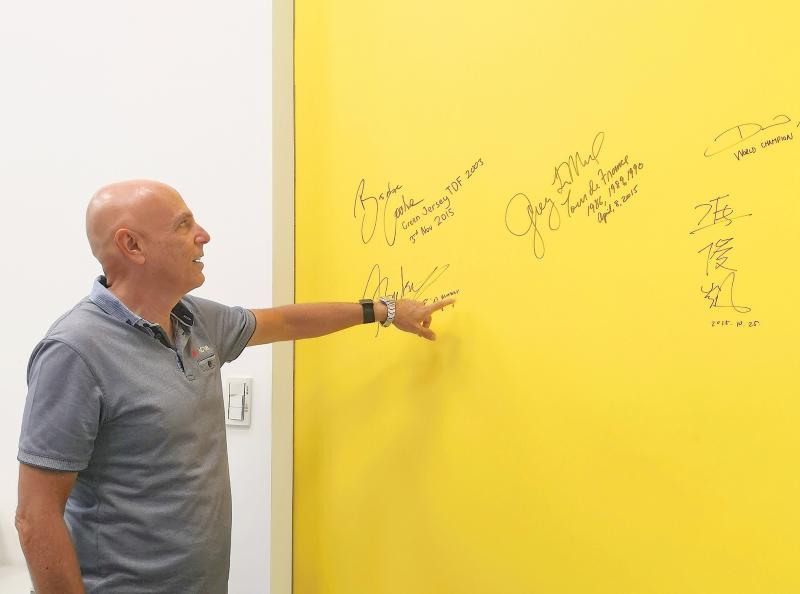
Photo: Mark Caltonhill
Back in Taichung they continued to focus on quality, there being no way to take on Giant and Merida in the mass market. Combining their experience from racing with Taiwan’s cutting edge technological developments, they sought to produce ultralight aerodynamic bikes that could compete with the world’s best, Gitelis says.
“The material costs for most top-quality frames are around US$120,” he says, “ours are almost twice that. And if I have to spend US$50 to make it better, I will.”
Pro-conti teams race against and exchange athletes with the top-echelon World Tour teams, so it wasn’t long before leading athletes took notice of the new kid on the block.
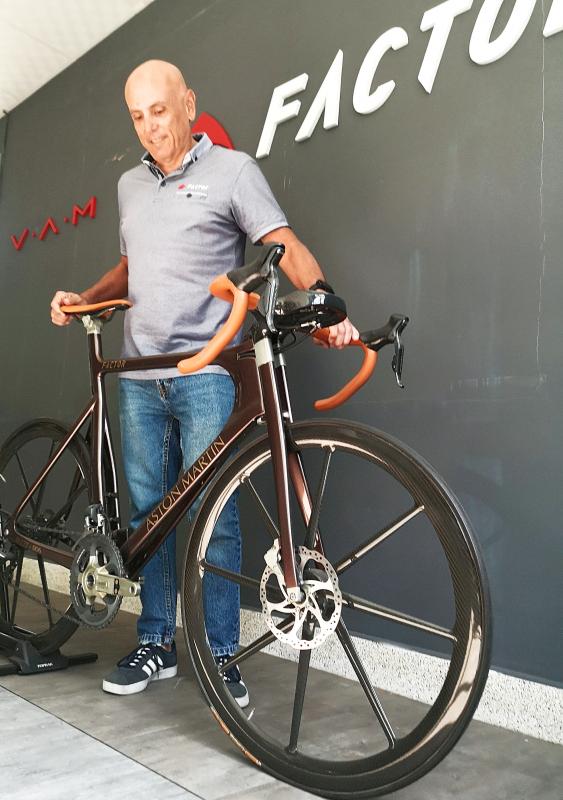
Photo: Mark Caltonhill
ONE YEAR EARLY
Just nine months, in fact.
Frenchman Romain Bardet, who came second in the 2015 TdF, was looking for a new ride, and Factor was among the bikes he asked to try, says Gitelis. And the one he chose.
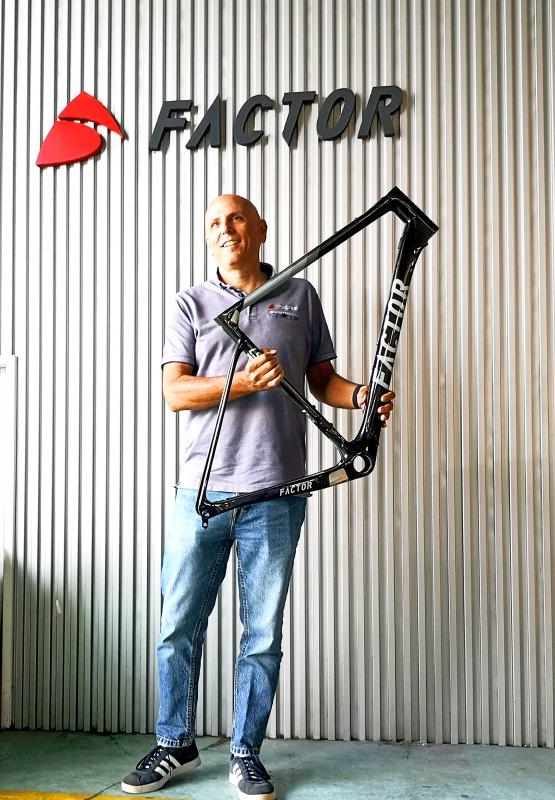
Photo: Mark Caltonhill
In less than a year since buying the brand and designing the models, they were invited to the sport’s top table. Their bikes would appear on TV screens across the world and, if Bardet could repeat or perhaps even improve on his position, the world might be their oyster.
“But remember, we still hadn’t sold a single bike.”
The company’s entire production in that first year had gone to provide ONE Pro Cycling with the 80 frames stipulated in their contract. And even if they could upscale production to meet any increase in customer interest, they didn’t have a distribution network to take advantage of it.
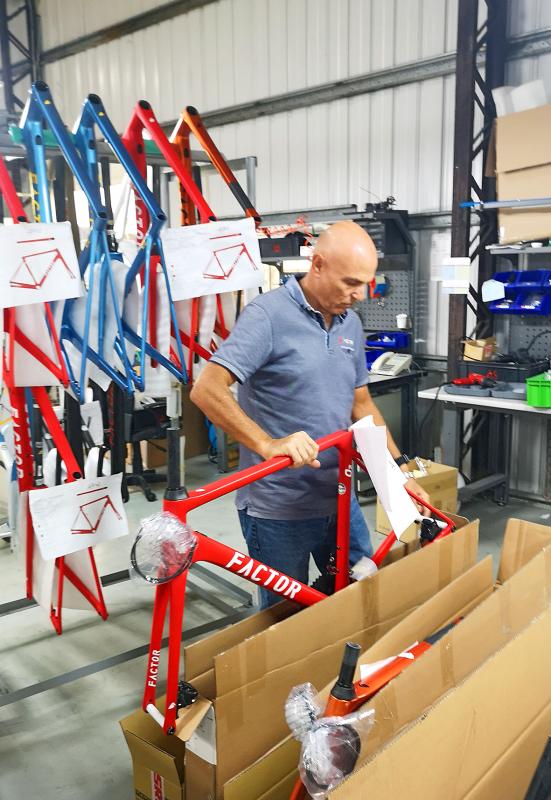
Photo: Mark Caltonhill
Gitelis must have had great confidence, not to mention deep pockets. Not only would he have to find the US$2 million or so for the next two years, but sponsoring a tier-one World Tour team is entirely different to the level below. Now he would have to supply 280 bikes to Bardet and the AG2R squad, and these would be complete bikes with top-level Shimano Dura Ace groupsets and comparable quality wheels, not just frames.
In the end, all turned out well. Bardet came third in the 2016 and Factor’s sales went through the roof (Gitelis won’t put a figure on it, but says it is less than 10,000 per year, compared with figures of 6 million-plus for companies like Giant), and more than 200 dealers now sell the bikes in 30 countries. After sponsoring AG2R for the second year, they stepped back to take stock.
“To be honest, it all happened a little fast,” he says. “Probably one year earlier than we were ready for.”
Nevertheless, they again sponsored a pro-conti outfit, as well as the Holland-based Parkhotel Valkenburg (PHV) team on the women’s tour. Speaking of this puts a smile on Gitelis’ face.
“Women’s racing is great. It’s just as exciting as men’s, but of course they don’t get the same exposure.”
Still, whether because of sponsoring the PHV team, or the achievements of its world number-one Lorena Wiebes, “or maybe because we’re seen as a non-sexist company in a world of … well, you can imagine,” sales of Factor’s women’s bikes are steadily growing.
“Women riders better understand our goal,” he says. “Their use of social media is much more focused on the product, whereas men tend to talk about competitions and results.”
BACK AT TOP TABLE
After one year, it was time to come back. He’d been in contact with the Israeli outfit for three years when it decided to rebrand and relaunch on the World Tour, so he knew it was looking for a new bike sponsor.
“And the fit felt right.”
Although ostensibly an Israeli team, they were more international than most top-level squads, with riders from at least 10 countries including Germany, Holland, Ireland and the UK.
“And there are two Muslims,” Gitelis adds, noting that he has been attacked on social media for “supporting the ‘evil nation’ of Israel.”
Of course, to land the three-year contract took more than US$2 million and 250 top-quality bikes. “Cyclists have more say than they used to, so really it is not easy to walk up with five million and a rubbish bike these days.”
In particular, they had to get the nod from UK’s four-time TdF champion Chris Froome who had signed to switch to ISN at the beginning of next year. Like Bardet before him, he had a number of bikes to choose from, including Factor.
Was he worried watching Froome try his bike?
“Fortunately, due to the coronavirus pandemic, I wasn’t there in person. But of course I was very happy with his decision and look forward to him riding Factor bikes in the Tour de France next year.”
Mark Caltonhill bikes, and writes, and writes about bikes.

Taiwan has next to no political engagement in Myanmar, either with the ruling military junta nor the dozens of armed groups who’ve in the last five years taken over around two-thirds of the nation’s territory in a sprawling, patchwork civil war. But early last month, the leader of one relatively minor Burmese revolutionary faction, General Nerdah Bomya, who is also an alleged war criminal, made a low key visit to Taipei, where he met with a member of President William Lai’s (賴清德) staff, a retired Taiwanese military official and several academics. “I feel like Taiwan is a good example of

March 2 to March 8 Gunfire rang out along the shore of the frontline island of Lieyu (烈嶼) on a foggy afternoon on March 7, 1987. By the time it was over, about 20 unarmed Vietnamese refugees — men, women, elderly and children — were dead. They were hastily buried, followed by decades of silence. Months later, opposition politicians and journalists tried to uncover what had happened, but conflicting accounts only deepened the confusion. One version suggested that government troops had mistakenly killed their own operatives attempting to return home from Vietnam. The military maintained that the

Before the last section of the round-the-island railway was electrified, one old blue train still chugged back and forth between Pingtung County’s Fangliao (枋寮) and Taitung (台東) stations once a day. It was so slow, was so hot (it had no air conditioning) and covered such a short distance, that the low fare still failed to attract many riders. This relic of the past was finally retired when the South Link Line was fully electrified on Dec. 23, 2020. A wave of nostalgia surrounded the termination of the Ordinary Train service, as these train carriages had been in use for decades

Lori Sepich smoked for years and sometimes skipped taking her blood pressure medicine. But she never thought she’d have a heart attack. The possibility “just wasn’t registering with me,” said the 64-year-old from Memphis, Tennessee, who suffered two of them 13 years apart. She’s far from alone. More than 60 million women in the US live with cardiovascular disease, which includes heart disease as well as stroke, heart failure and atrial fibrillation. And despite the myth that heart attacks mostly strike men, women are vulnerable too. Overall in the US, 1 in 5 women dies of cardiovascular disease each year, 37,000 of them